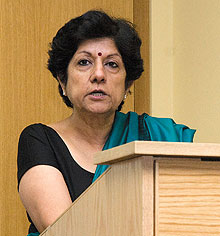  |
| HOME | THIS ISSUE | CALENDAR | GRANTS | BACK ISSUES | < BACK | NEXT > |
Diplomat discusses emergence of India on world economic stage
by Michael Kirk - November 13, 2007
|
||||
| Amid news of martial law in Pakistan, war in Afghanistan, a crackdown on pro-freedom dissidents in Myanmar, and nuclear saber-rattling in Iran, India is beginning to look like “an oasis of democracy” in a troubled region, according to Neelam Deo, India’s consul general in New York City, who spoke at UConn on Nov. 2. The lecture, “India’s Emergence as a Major Political/Economic Power,” was hosted by the India Studies Program and sponsored by the Center for International Business, Education, and Research. Deo also visited the business school and spoke to the MBA Business Club, and met with members of the administration, including President Michael Hogan. Deo, an economist and former ambassador to Denmark and the Ivory Coast, said that when India gained independence in 1947, the country faced serious economic hardship as a result of its colonization by Britain. “We really inherited a very difficult economic situation as well as social situation,” she said. But in the last 20 years, India has gone from an economic growth rate of about 6 percent a year to 9.4 percent last year; and while 51 percent of the population lived in poverty 20 years ago, that number is now at 20 percent. Today, India is the world’s fourth largest economy. “It really is Asia that is growing,” said Deo, noting that she foresees a similar rate of growth through 2020 for her nation. The vibrant economy has helped create a middle class of more than 300 million people, and is fueled by India’s two million new college graduates each year. Deo said that while her nation has distinguished itself in the field of information technology, it is also expanding into new economic frontiers including biotechnology and nanotechnology. She said when foreigners visit India, they will find a “huge sense of optimism” and, among the work force, “a fiercely competitive spirit.”
The growing economy has also created new challenges: like many industrial nations, India is concerned about maintaining access to sources of energy; fighting disease, terrorism, and natural disasters; and improving the quality of life among its people. “It is the objective of successive governments to improve the standard of living,” said Deo. One of India’s top foreign policy priorities is continuing to build a strong relationship with the U.S. The goal is apparently mutual. Deo cited statements by U.S. Undersecretary of State Nicholas Burns, for example in the pages of Foreign Affairs, where he hailed the rise of a democratic and economically powerful India. She added that Indian students and Indian immigrants working in the U.S., especially in the fields of medicine, law, and academia, provide a strong link between the two nations. Deo suggested that India’s increasing importance on the world’s stage merits its inclusion in the United Nations Security Council, which currently includes only China, France, Russia, the U.S., and Britain as permanent members. She also said that while India’s stability makes it an attractive and “safe” place for international investment, that is in contrast to many its neighbors. “Our own immediate neighborhood is really an area of concern,” she said. “All of our neighbors are facing varying degrees of difficulty in making the transition to democracy. Instability in the neighborhood is not good for anybody.” |
| ADVANCE HOME UCONN HOME |

